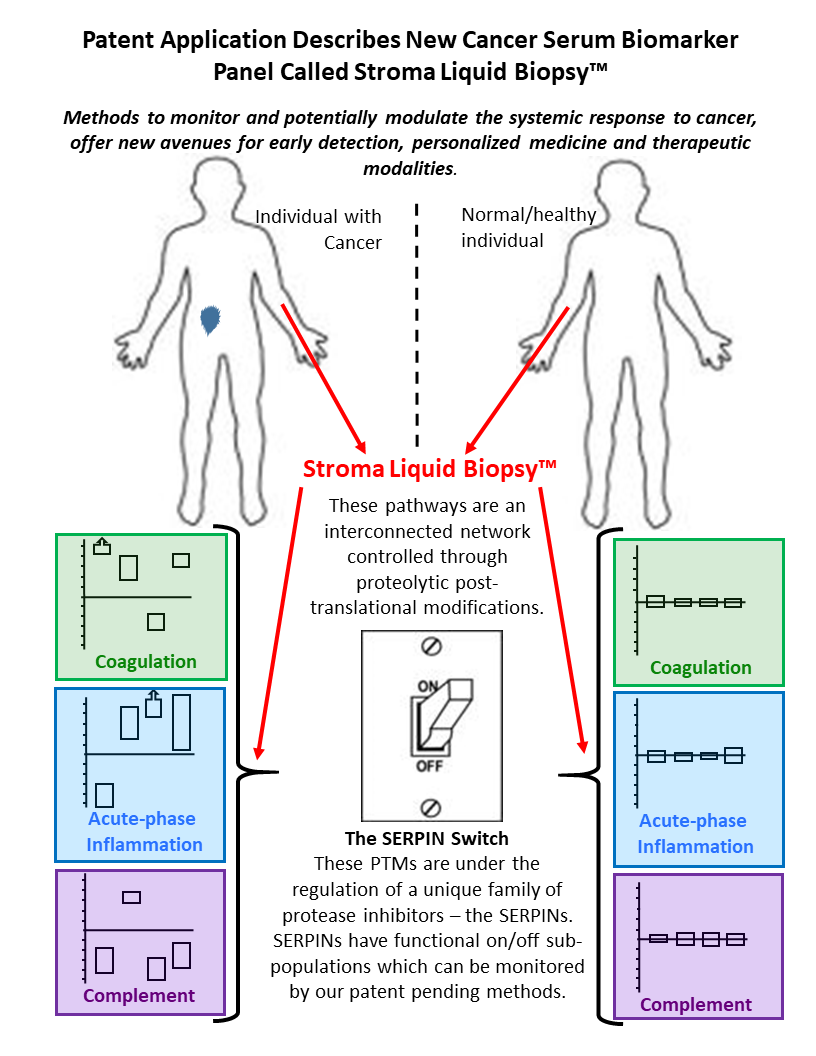
Stroma liquid biopsy™ biomarkers profile pan-cancer dysregulation of the serum proteome
Methods to monitor the influence, potentially modulating the systemic response to cancer, offer new avenues for diagnosis, personalized medicine and therapeutic modalities.
Background
The landscape of cancer-associated DNA mutations has supported the initial enthusiasm for liquid biopsies, a non-invasive way to characterize molecular changes taking place due to the presence of a tumor. Nevertheless, it is now overwhelmingly apparent that the necessary adaptive microenvironments to support metastatic disease cannot be fully characterized by genomic data alone. This is especially important with the emergence of immuno-oncology therapies.
As a result, there remains a significant unmet medical need for protein biomarkers derived from blood, which can detect cancer early and personalize treatment.
The Challenge
While most protein biomarker investigations focus on identifying very low abundance proteins shed from malignant cells, the discovery, characterization and monitoring of ‘needle in the haystack’ type biomarkers remains an industry-wide challenge. By contrast, Biotech Support Group investigations focused on quantification of the serum proteome mid-abundance [μg-mg]/ml range- often not even considered in biomarker discovery.
Yet, this range is known to be quantitative by LC-MS/MS with precision comparable to current clinical immunoassays.
The Solution: Methods to Monitor the Systemic Response to Cancer
Biotech patent discloses 12 proteins differentially regulated in cancers of all stages, and all 5 primary tumors of origin tested to date. Special significance of this profile included changes that were categorical and contained within three systemic response pathways:
- acute-phase inflammation
- coagulation
- complement cascade
In addition, the pathways all intercommunicate in a network of cascading proteolytic events.
Because proteolysis is irreversible, therefore highly regulated, controlling this interdependent network of regulation falls to a very unique family of suicidal protease inhibitors – called the SERPINs.
By leveraging our capacity to observe functional features that report an imbalance of SERPIN sub-populations, this patent discloses a relative exhaustion of active protease inhibitors in the cancer population. Most significantly, such chronic imbalance may be central to understanding how individuals uniquely respond to the presence of cancer anywhere in the body. Consequently, new insights may be derived into the mechanisms that drive cancer pathogenesis and metastatic dissemination.
The Outcome
With many diseases, syndromes and cancers that present clinically with very vague symptoms initially, diagnosis becomes difficult. In many cancer cases, late diagnosis can significantly impact outcomes. The most compelling prospect for
Stroma Liquid Biopsy™ is as a new way to fundamentally think about the microenvironment componentry of cancer.
At Biotech, we can now monitor the influence of an individual’s unique systemic response to malignant tissue separate and apart from characterizing a tumor’s proliferating cells. With the advent of the many new liquid biopsy and immuno-oncology technologies, we are moving closer to a time when cancer can be diagnosed and treated with personalized therapies that modulate the systemic response to cancer.
Ideally, these clinical interventions would be at pre-cancerous or very early stages when treatments can be most effective. Upon further validation, biomarker guidance from
Stroma Liquid Biopsy™ will create many new opportunities to monitor risk factors, screen for early detection, personalize therapies and direct new therapeutic modalities.
References
- U.S. Patent Application No. 15/953,260, entitled “Monitoring Dysregulated Serum Complement, Coagulation, and Acute-Phase Inflammation Sub-Proteomes Associated with Cancer”, filed April 13, 2018.
- Stroma Liquid Biopsy – Pan-Cancer Dysregulation of the Serum Proteome. Poster reprint from US HUPO 2018 Conference, Minneapolis, MN, USA March 12-14, 2018.
- Stroma Liquid Biopsy – Biomarkers of the Dysregulation of the Serum Proteome in Cancer. Oral presentation at the 16th Human Proteome Organization World Congress, Dublin, Ireland September 2017.
- The Commonality of the Cancer Serum Proteome Phenotype as analyzed by LC-MS/MS, and Its Application to Monitor Dysregulated Wellness. Poster Reprint First Presented At AACR Annual Meeting 2016 Conference, Held April 17-20, 2016 New Orleans, LA USA.
To learn more, or to discuss license, collaboration and partnership opportunities, please contact:
Matthew Kuruc 732-274-2866
mkuruc@biotechsupportgroup.com
|